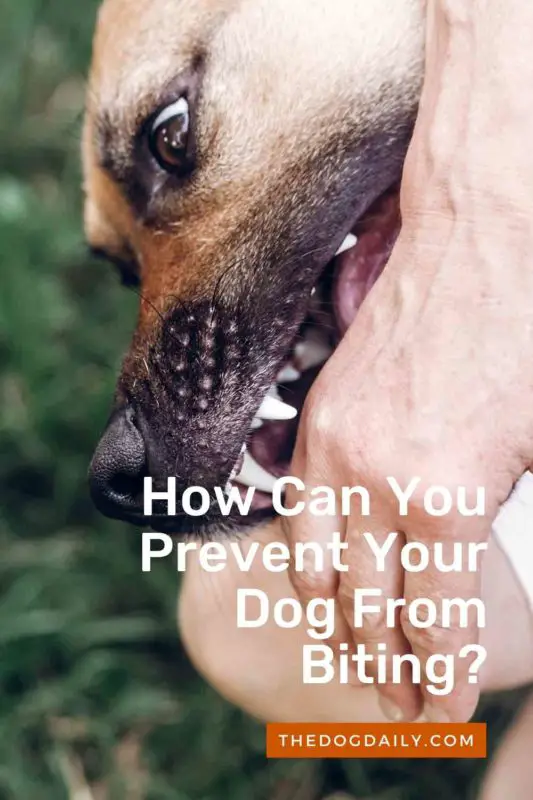Is It Normal for Dogs to Nip?
“Bite inhibition” is somewhat of a misleading phrase. The word “inhibition” typically means something that restrains, blocks, or suppresses. That is only partially true for a dog engaging in bite inhibition. Dogs and cats have much more control over biting than you probably realize. They don’t just bite down on something with the same force each time. As the dog eats, that is expected, needing to crunch down with pressure on a hard biscuit, for example, but with less energy for a tender morsel of dog chow. But dogs use this same adjustment when biting others, including humans and different dogs. So how do you stop your dog from biting?
Evelyn Pang and Hilary Louie, authors of the book Good Dog!: Kids Teach Kids About Dog Behavior and Training, explain that bite inhibition is when your dog bites down on you without pushing in with its teeth. Mostly, it is mouthing or nipping you. Puppies do this a lot, nipping at your heels and other places. In the case of puppies, young dogs are often just playfully exploring their environment. Nipping is one way to test the waters using their teeth and mouth and see how others will react.
How Do I Get My Dog to Stop Nipping?
For older dogs that bite in this seemingly harmless way, the dog is giving you a warning. You might be uncomfortably brushing the dog or doing something else that is painful or stressful. If you do not heed the bite inhibition warning, the next bite will not be so gentle. If your dog nips for seemingly no reason, you might schedule a veterinary visit, as cranky dogs may have an underlying health issue. Your dog could also need a training refresher course to prevent the painless bites from turning into something more serious.
New York City graduate student Lacey Brown was walking her roommate’s German Shepherd last fall when the dog lunged and bit an elderly neighbor on the wrist. “The dog had been growling at people when we were out together, something he never did when he was with his owner,” she laments. “I should’ve stopped walking him when the growling began.”
Dr. Katy Nelson, an emergency veterinarian in Virginia, concurs: “You have to know your dog and what it’s capable of. This dog probably viewed his owner as the alpha and the roommate as the beta; the dog protected Lacey, whom he considered his. You have to make sure your dog knows you’re higher in rank to prevent incidents like this.”
The Facts on Dog Bites
According to the Centers for Disease Control, over 4.5 million Americans are bitten by dogs each year. Of those, one in five requires medical attention. Additionally, around 31,000 people need reconstructive surgery each year as a result of a dog bite.
Children are most likely to be the victims of dog biting incidents, as are people with multiple canines in their homes. To raise awareness and combat dog biting, the American Veterinary Medical Association sponsors National Dog Bite Prevention Week each May.
How Can You Prevent Your Dog From Biting?
In honor of National Dog Bite Prevention Week, Nelson offers advice on protecting yourself and your pet from strange dogs and protecting strangers from your best friend:
-
Don’t Make Assumptions Based on Breed
“Sure, Pugs and Golden Retrievers generally have gentle temperaments, but every single breed is going to have an exception to the rule,” emphasizes Nelson. “I’ve seen everything from aggressive Pugs to Pit Bulls who like to roll around on the floor kissing their owners.”
-
Ask Permission To Approach a Strange Dog
Never touch a strange dog, or let your dog approach another dog without first checking with its owner. “It dumbfounds me when people let their kids walk around my waiting room petting the dogs there, but I see it all the time,” says Nelson. Most people will be happy to tell you if their companion is good with strangers and specifically with children and other dogs.
-
Proceed With Caution Around a Strange Dog
“Just because someone says their dog is great with people and other pets doesn’t mean they’ll be great with you or your pet at that moment,” warns Nelson.
-
Be Aware of Your Body Language
Dogs are more likely to bite when they are anxious. Approaching them in the wrong way can only exacerbate their anxiety. Nelson recommends sticking your hand out, palm facing up, for the animal to sniff. “If it’s a big dog, I might do this from a standing position,” she says. “With a smaller dog, I crouch down. If you move toward them with a non-aggressive posture, you decrease the likelihood of aggression coming back at you.”
Protecting Others From Your Dog Biting
-
Know Your Dog
Be realistic and honest with other people about what your dog is capable of. If your dog is a biter, it’s up to you to prevent it. Know your pet’s telltale signs of anxiety and aggression: If its ears go back and its hackles go up, the dog is saying it’s uncomfortable and needs to get out of its current situation.
-
Teach Your Dog Who’s Boss
Nelson has made sure her dogs know that her 2-year-old son is alpha to them in her own home. “It’s a daily thing in my house, showing them that I’m first, then my son and then them,” she says. Nelson does this by monitoring all dog-child interactions and quickly putting a stop to it if one of them tries to challenge the boy.
-
Minimize Your Dog’s Anxiety
If you know your dog gets excessively anxious in the presence of strangers or at the dog park, lock it up in your bedroom when friends visit, and don’t take it to the playground. Keeping your dog calm will minimize the chance that it will become aggressive.
Luckily for Lacey Brown, her roommate’s Shepherd only broke her neighbor’s watch and not his skin. “The man was angry, and I felt horrible, but it could have been worse,” she says. With Nelson’s advice, Brown doesn’t have to worry about the Shepherd’s bad habits anymore.
Article written by Author: Darcy Lockman, The Dog Daily Expert

